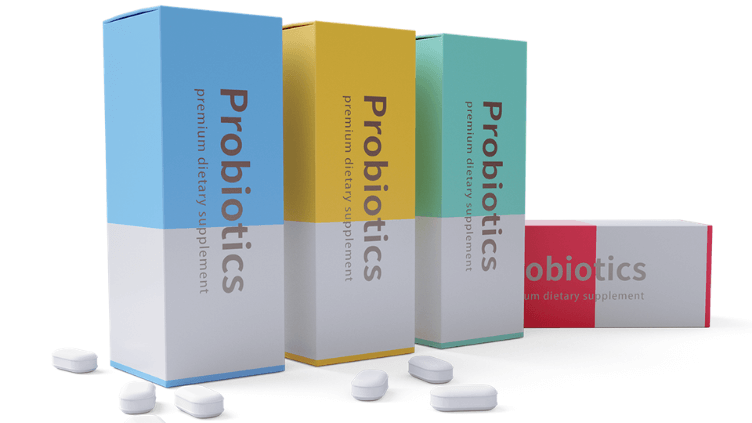Probiotics are bacteria that can improve the health of the human digestive system. They are found in a number of natural foods and are also available in supplement form. Taking probiotics is beneficial for colitis and gastritis – and is often recommended after a course of antibiotics.
What probiotics exist – types and classification. What is the effect of lactic acid bacteria on the stomach and on the body as a whole? Do they really improve the functioning of the immune and digestive systems? When is the best time to supplement, before or after meals?
The first probiotic studies were carried out in the early 20th century and it was shown that lactic acid bacteria have a beneficial effect on health. Bifidobacteria were discovered in 1917, and lactobacilli – in 1935. In their natural form, these bacteria are found in many dairy products.

A key benefit of probiotics is their effect on the gastrointestinal tract, which can lead to improved immunity. In addition, they can stimulate the production of enzymes needed to break down gluten or lactose.
We hear a lot about maintaining a healthy gut microflora, especially when we are taking antibiotics, experiencing stress, or eating poorly. However, are health benefits of probiotic supplements and bacteria exaggerated? Is it necessary to take probiotics products as a supplement, or is it enough to eat right and consume foods that help the growth of gut micro-flora?
Probiotics - what are they?
Probiotics are live cultures that can inhabit the human intestinal micro-flora and fight pathogenic bacteria. The most common types are bifidobacteria, lactobacilli and saccharomycents (a type of yeast).
The first probiotic studies were carried out in the early 20th century and showed that lactic acid bacteria have a beneficial effect on health. Bifidobacteria were discovered in 1917, and lactobacilli – in 1935. In their natural form, these bacteria are found in many dairy products.
A key benefit of probiotics is their effect on the gut, which can lead to improved immunity. In addition, they can stimulate the production of enzymes needed to break down gluten or lactose.
How do they work?
The principle of action of probiotics is based on their ability to improve the intestinal micro-flora. In particular, they affect the acidity of gastric juice – making it difficult for unwanted bacteria to multiply. They also compete with pathogens for nutrients and get rid of toxins.

From a practical point of view, it is also important to note that use of probiotics normalizes the functioning of the stomach, strengthening it and helping prevent diarrhea. However, the effect of probiotic therapy is usually observed exclusively during the course of admission and disappears a few days after its termination.
Bacteria: where is the border between benefit and harm?
We are constantly surrounded by billions of bacteria. Some of them are frankly harmful, and if they enter the body, diseases and inflammatory processes occur. There are bacteria that are conditionally pathogenic, that is, they do not harm if you are healthy and your immunity is strong, but they can do wreak havoc in your body if you catch a cold or overwork.
However, there are beneficial bacteria, they live not only in the intestines, but also in the oral cavity, in the vagina, and on the surface of the skin. They protect our body, help digest food, and stimulate our immunity. It is these beneficial live and active cultures that are called probiotics. They can take root in the intestines, stimulating the body to more actively fight external stress factors, they synthesize vitamin K, help break down food, normalize stool and train the immune system. In addition, in recent years, publications have appeared that the intestinal micro-flora has a special effect on the brain, activating its work. And naturally, many of you get the idea that if these microbes are so beneficial, you need to replenish their stores in the intestines.
Probiotics: where do they come from?
Under natural conditions, probiotics enter the body with a variety of foods and drinks. In addition, they can be obtained by using various food additives – capsules, syrups, tablets. Why are they called such a convoluted term? “Probiotic” stands for “pros” – this is movement, and “bios” – life, that is, moving, stimulating life.
The first probiotics were discovered a century ago, after observing the inhabitants of Bulgaria, who were distinguished by longevity, although they lived in poverty-stricken conditions and a rather harsh climate. But these people ate a lot of yogurt, dairy products, and scientists suggested that it is possible to prolong life and delay the onset of old age through use of certain food components. This is how the bacteria that create fermented milk products were discovered. They were similar to bacteria that were then found in the intestines of humans. Today it is determined that more than 5 lb of microbes live in the human body, which help us survive unseen dangers every day and feel better.

Modern probiotics
In order to facilitate understanding and bring all probiotic products to a single standard, a meeting was held in 2013 for clinical experts and researchers on probiotics. Experts from various fields of medicine have worked to redefine the concept of probiotics and the definition of these products. Today, they define a probiotic as a living microorganism that, when used in adequate amounts, brings a certain benefit to the host. In addition, experts have distinguished between foods that contain probiotics and those that contain active or live cultures of microbes. The latter can be any food product with fermentation microbes, which are contained in the product in a volume of 1 × 109 CFU (colony forming units) per 100 g of product. No scientific research is required to refer to such foods using the term “good bacteria”.
It is quite another matter when it comes to probiotics. These must be species of bacteria that are safe for humans, whose properties have been confirmed by scientific research. Their beneficial health effects must also be proven. In addition, they must survive well in food or supplements throughout the shelf life. That is, to be labeled “probiotic”, the bacteria injected must only be those for which safety and efficacy studies have been conducted. These microorganisms can help in correcting dysbiosis, treating certain diseases of the digestive system and the whole body, as well as fighting against obesity and diabetes.

Probiotics tablets – should you take them and why?
Colitis and gastritis are direct indications for taking probiotics. Since in both cases we are talking about inflammation of the mucous membrane of the large intestine, the positive effect of bacteria will manifest itself rather quickly – in the form of improved digestion and reduction of stomach pain.
Research shows probiotics can reduce calcium loss – important for arthritis. In addition, scientific work speaks of probiotic benefits in breastfeeding. Probiotics give a significant reduction in the length of time a baby cries – especially during the first 3 weeks.
Benefits of probiotics:
- prevention and treatment of infectious diarrhea
- improving the functioning of the immune system (by suppressing pathogenic bacteria in the intestines);
- prevention of allergic manifestations
- pain relief in irritable bowel syndrome
- lowering the risk of developing colon cancer
Benefits of probiotics:
- prevention and treatment of infectious diarrhea
- improving the functioning of the immune system (by suppressing pathogenic bacteria in the intestines);
- prevention of allergic manifestations
- pain relief in irritable bowel syndrome
- lowering the risk of developing colon cancer
Before or after meals?
Probiotics are usually recommended to be taken on an empty stomach – not earlier than 30 minutes before eating. In the case of lactobacilli, this allows them to adhere more quickly to the walls of the colon – multiplying and having a positive effect on the intestines.
In some cases, manufacturers advise drinking probiotics in the evening, before going to bed – in this case, maximum efficiency is achieved in the form of unimpeded work of beneficial bacteria.
Good quality probiotics contain about 1-10 billion CFU per dose. It is believed that this number of microorganisms is optimal, but the daily dose may vary depending on the strain of bacteria and the needs of a particular organism.
What problems can probiotics solve?
The beneficial bacteria found in foods or probiotic supplements are thought to help regulate digestion and prevent a variety of gastrointestinal disorders. They can be helpful for gastroenteritis, constipation and irritable bowel syndrome, as well as diarrhea or indigestion. In addition, they are assigned a role in the prevention of certain types of cancer. They can reduce symptoms of inflammation and allergies, correct immunodeficiency conditions, and fight fatty liver.
In addition, some studies have shown that taking certain probiotic foods, especially during adolescence and in women during menopause, helps in the absorption of calcium, which is necessary to maintain bone density and prevent fractures.
There is evidence of the benefits of probiotics in the treatment of diabetes and obesity. Taking probiotic foods can regulate energy intake, satiety, and weight control.
In addition, probiotics inhibit the growth of harmful microbes in the intestines, preventing various intestinal infections, diarrhea and vomiting. If you lead an unhealthy lifestyle, eat poorly, constantly get stressed, or take antibiotics a lot, your beneficial microbes may suffer. In these cases, probiotic therapy can help restore the balance of microbes in the gut.
Probiotics and Immunity
We all know that we have an immune system that is designed to protect our body from viruses, microbes and fungi that invade it. But how then does it react to bacteria in the intestinal lumen? These microbes are familiar to our immune system from birth, they are not perceived as foreign and dangerous, but at the same time they train the immune system, teach it to cope with dangerous microbes.
If there are few beneficial microbes and the immune system is poorly trained, then allergies, autoimmune pathologies and frequent infections can be a likely consequence. Therefore, it is important to ensure that the intestines are colonized with beneficial microbes from birth, and then maintain a healthy digestive system for life.
Are there any side effects?
Given the fact that probiotics are bacteria, albeit beneficial, there may be side effects when taken. They are associated with the process of colonization and adaptation to new residents. Probiotics usually have very minor side effects, such as bloating or flatulence.
Some people may have more serious disorders if, for some reason, these bacteria are simply not suitable for them. This is especially dangerous if probiotics are taken without the advice of a doctor and are not selected with special care. Probiotics are dangerous for people with immunodeficiency, some genetic disorders, and after prolonged and massive antibiotic treatment.
Usually, probiotics are recommended to those people who eat poorly or sporadically, cannot tolerate dairy products, or eat little plant foods. Also, these are living bacteria that must be stored under the right conditions in order not to lose their activity.
If you want to take probiotics, you should discuss this with your doctor first. This is especially important during pregnancy and breastfeeding, in old age or with a weakened immune system, in children under 5 years of age. If you are someone who has undergone chemotherapy or other cancer treatment options, such supplements can only do harm. Immunity is weakened, and even habitual microbes can become dangerous.

Classification and where probiotics are contained
Probiotics are found in small amounts in many foods – examples include bread, fruits, vegetables, meats, cereals, yogurt, kefir and some types of cheese. Most of all beneficial bacteria are found in fermented milk products.
The most common probiotics are yeast (Saccharomyces cerevisiae) and bacteria of various genera (Lactobacillus, Streptococcus, Enterococcus, Pediococcus, Bacillus Escherichia). Each probiotic product plays a specific role in the digestion process.
Yogurts usually contain the Befidobacterium Lactobacillus. It is often used to restore microflora after gastritis attacks, as well as to prevent stomach infections.

Probiotic products:
- Kefir and yogurt
- White cheese
- Sauerkraut
- Soy beverages
- Japanese miso soup
- Korean dish kim-chi
- Tea mushroom
Probiotics are live cultures that improve the condition of the human digestive system. They are found in small amounts in many foods, primarily those containing lactic acid or as found in fermented products. Make probiotics part of your healthy lifestyle.
Do dairy products cause cellulite?
| No, that is wrong. While milk does raise blood insulin levels, this has nothing to do with the appearance of cellulite and inflammation (if you digest lactose - milk sugar). Cellulite occurs when the subcutaneous connective tissue becomes weak and deformed due to inadequate diet and lifestyle. The most common reason is that unwanted substances and toxins are not eliminated from the body. | |
| Yes, that's right. There is no direct connection between cellulite and milk sugar. This is just one of the marketing pitfalls of new "plant-like" milk substitutes: soy milk, almond milk, etc. People had to be convinced that they should not drink natural milk but should drink its "harmless" substitutes like vegetable ones. |





